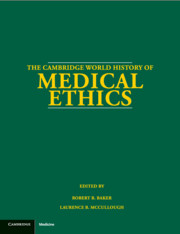Book contents
- Frontmatter
- PART I AN INTRODUCTION TO THE HISTORY OF MEDICAL ETHICS
- PART II A CHRONOLOGY OF MEDICAL ETHICS
- PART III DISCOURSES OF MEDICAL ETHICS THROUGH THE LIFE CYCLE
- PART IV THE DISCOURSES OF RELIGION ON MEDICAL ETHICS
- PART V THE DISCOURSES OF PHILOSOPHY ON MEDICAL ETHICS
- PART VI THE DISCOURSES OF PRACTITIONERS ON MEDICAL ETHICS
- 19 The Discourses of Practitioners in Africa
- 20 The Discourses of Practitioners in India
- 21 The Discourses of Practitioners in China
- 22 The Discourses of Practitioners in Japan
- 23 The Discourses of Practitioners in Ancient Europe
- 24 The Discourses of European Practitioners in the Tradition of the Hippocratic Texts
- 25 The Discourses of Practitioners in the Ninth- to Fourteenth-Century Middle East
- 26 The Discourses of Practitioners in Medieval and Renaissance Europe
- 27 The Discourses of Practitioners in Sixteenth- and Seventeenth-Century Europe
- 28 The Discourses of Practitioners in Eighteenth-Century France and Germany
- 29 The Discourses of Practitioners in Eighteenth-Century Spain
- 30 The Discourses of Practitioners in Eighteenth-Century Britain
- 31 The Discourses of Practitioners in Eighteenth-Century North America
- 32 The Discourses of Practitioners in Nineteenth- and Twentieth-Century France
- 33 The Discourses of Practitioners in Nineteenth- and Twentieth-Century Spain
- 34 The Discourses of Practitioners in Nineteenth- and Twentieth-Century Germany
- 35 The Discourses of Practitioners in Eighteenth- to Twentieth-Century Russia and Soviet Union
- 36 The Discourses of Practitioners in Nineteenth- and Twentieth-Century Britain and the United States
- 37 The Discourses of Practitioners in the Modern and Contemporary Islamic Middle East
- PART VII THE DISCOURSES OF BIOETHICS
- PART VIII DISCOURSES ON MEDICAL ETHICS AND SOCIETY
- Appendix: Biographies: Who Was Who in the History of Medical Ethics
- Bibliography
- Index
22 - The Discourses of Practitioners in Japan
from PART VI - THE DISCOURSES OF PRACTITIONERS ON MEDICAL ETHICS
Published online by Cambridge University Press: 28 May 2012
- Frontmatter
- PART I AN INTRODUCTION TO THE HISTORY OF MEDICAL ETHICS
- PART II A CHRONOLOGY OF MEDICAL ETHICS
- PART III DISCOURSES OF MEDICAL ETHICS THROUGH THE LIFE CYCLE
- PART IV THE DISCOURSES OF RELIGION ON MEDICAL ETHICS
- PART V THE DISCOURSES OF PHILOSOPHY ON MEDICAL ETHICS
- PART VI THE DISCOURSES OF PRACTITIONERS ON MEDICAL ETHICS
- 19 The Discourses of Practitioners in Africa
- 20 The Discourses of Practitioners in India
- 21 The Discourses of Practitioners in China
- 22 The Discourses of Practitioners in Japan
- 23 The Discourses of Practitioners in Ancient Europe
- 24 The Discourses of European Practitioners in the Tradition of the Hippocratic Texts
- 25 The Discourses of Practitioners in the Ninth- to Fourteenth-Century Middle East
- 26 The Discourses of Practitioners in Medieval and Renaissance Europe
- 27 The Discourses of Practitioners in Sixteenth- and Seventeenth-Century Europe
- 28 The Discourses of Practitioners in Eighteenth-Century France and Germany
- 29 The Discourses of Practitioners in Eighteenth-Century Spain
- 30 The Discourses of Practitioners in Eighteenth-Century Britain
- 31 The Discourses of Practitioners in Eighteenth-Century North America
- 32 The Discourses of Practitioners in Nineteenth- and Twentieth-Century France
- 33 The Discourses of Practitioners in Nineteenth- and Twentieth-Century Spain
- 34 The Discourses of Practitioners in Nineteenth- and Twentieth-Century Germany
- 35 The Discourses of Practitioners in Eighteenth- to Twentieth-Century Russia and Soviet Union
- 36 The Discourses of Practitioners in Nineteenth- and Twentieth-Century Britain and the United States
- 37 The Discourses of Practitioners in the Modern and Contemporary Islamic Middle East
- PART VII THE DISCOURSES OF BIOETHICS
- PART VIII DISCOURSES ON MEDICAL ETHICS AND SOCIETY
- Appendix: Biographies: Who Was Who in the History of Medical Ethics
- Bibliography
- Index
Summary
INTRODUCTION
Contemporary Japanese medicine is comparable to medicine in Europe and the United States; however, Japanese medicine has a vastly different history. Japanese medical ethics developed in the framework of a unique discourse integrating concepts of nature, the human body, and medical practice. The understanding and practice of medicine in Japan has been strongly influenced by the acceptance of medical knowledge from countries such as China, Korea, Spain, Portugal, Netherlands, Germany, Britain, France, and United States. Nonetheless, elements of traditional Japanese medicine remain. The road to modern Japanese medical practice and ethical behavior was paved with different layers of medicine and culture over the past 2,000 years (Fujikawa [1904] 1941; Sakai 1986; Kimura 2004).
HEALING GODS IN THE ANCIENT FOLK MEDICINE
As in other parts of the world, Japanese mythological stories described the activities of healing gods. The Kojiki (712), Records of Ancient Matters, one of the oldest books of Japanese mythology and history, tells of the formation of Japan from its beginning until the reign of Emperor Suiko (592–628). This text states, “As everything was made by the spirit of the kami (god or deity), the intention of gods are the causes of all good and bad things.” Therefore, it was quite natural for the ancient Japanese to believe that diseases and wounds were due to some magical power of these invisible gods. This belief led to religious rituals being performed to heal the malignant physical and spiritual situations of illness (Sakai 2002, 57–70).
- Type
- Chapter
- Information
- The Cambridge World History of Medical Ethics , pp. 345 - 351Publisher: Cambridge University PressPrint publication year: 2008



